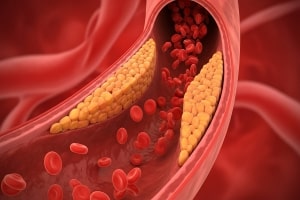 Mixed hyperlipidemia is a condition marked by elevated amounts of cholesterol and triglycerides. This genetic condition affects about 1% of people in Western countries, which means it is the most frequently occurring inherited lipid disorder. However, it greatly increases one’s risk of cardiovascular complications, including heart disease and stroke. Being aware of who is most at risk helps you identify symptoms early and get treated.
Mixed hyperlipidemia is a condition marked by elevated amounts of cholesterol and triglycerides. This genetic condition affects about 1% of people in Western countries, which means it is the most frequently occurring inherited lipid disorder. However, it greatly increases one’s risk of cardiovascular complications, including heart disease and stroke. Being aware of who is most at risk helps you identify symptoms early and get treated.
Your Genes Are the Primary Risk Factor
Your family history creates the most significant risk for mixed hyperlipidemia. This disorder is passed from parents to children through genetic inheritance, although researchers continue to study the specific mechanisms involved.
If a parent has mixed hyperlipidemia, you have a one in two chance of inheriting the condition. When both parents carry the condition, you may end up with what doctors dub a “double dose.” This can cause more severe problems to develop earlier in your life.
The high lipid levels begin appearing during your teenage years, even if you’re otherwise healthy. This early onset distinguishes genetic mixed hyperlipidemia from cholesterol problems that develop later due to lifestyle factors alone.
Medical Conditions Worsen Your Risk
Several underlying health conditions directly impact mixed hyperlipidemia development in genetically predisposed individuals. These conditions include diabetes, hypothyroidism, obesity, and alcohol use disorder.
Diabetes affects how your body processes fats and sugars properly. This leads to elevated triglyceride levels. When you have both diabetes and mixed hyperlipidemia, you have a particularly high risk for cardiovascular complications.
Hypothyroidism slows your body’s metabolism, including the breakdown of fats in your bloodstream. This hormonal imbalance pushes your lipid levels higher when you’re already genetically prone to mixed hyperlipidemia.
Obesity contributes to insulin resistance and metabolic changes that affect lipid processing. Carrying excess weight, especially around your midsection, compounds the cardiovascular risk already associated with mixed hyperlipidemia.
Age and Gender Create Different Patterns
Mixed hyperlipidemia can affect you at any age, but certain patterns emerge regarding when symptoms typically develop and worsen. The condition often becomes apparent during adolescence when genetic factors begin influencing your lipid metabolism more significantly.
Men usually develop cardiovascular complications earlier than women, in part because of differences in hormones. However, your risk increases substantially after the onset of menopause because of the decline in protective estrogen levels.
You encounter particularly high risks if you’re in your 40s and 50s with untreated mixed hyperlipidemia. This represents the age range when cardiovascular events become more common in genetically predisposed individuals.
Lifestyle Choices Compound Your Risk
 While mixed hyperlipidemia stems from genetic factors, certain lifestyle choices significantly worsen your condition and accelerate cardiovascular complications. Smoking represents one of the most dangerous risk multipliers because it damages your blood vessel walls and makes them more susceptible to cholesterol buildup.
While mixed hyperlipidemia stems from genetic factors, certain lifestyle choices significantly worsen your condition and accelerate cardiovascular complications. Smoking represents one of the most dangerous risk multipliers because it damages your blood vessel walls and makes them more susceptible to cholesterol buildup.
Poor dietary habits, especially consuming high amounts of saturated fats, trans fats, and refined carbohydrates, push your lipid levels even higher when you’re genetically predisposed. A sedentary lifestyle amplifies these effects by lowering your body’s ability to process fats efficiently.
Excessive alcohol consumption not only contributes to weight gain but also directly affects your triglyceride levels. This makes mixed hyperlipidemia more difficult to manage.
Geographic Patterns Affect Access to Care
Research shows that mixed hyperlipidemia affects approximately 1 percent of people in Western countries, though rates vary among different populations. Some ethnic groups appear to have higher genetic susceptibility to lipid disorders, though more research is needed to understand these patterns fully.
Individuals who live in areas where access to healthcare is limited have a higher risk of complications. Mixed hyperlipidemia often develops without obvious symptoms, so without regular cholesterol screening, the condition can progress undetected for years.
Warning Signs Are Often Silent
Mixed hyperlipidemia typically develops without noticeable symptoms, making your genetic and family history assessment particularly important. Your healthcare provider uses blood tests to measure your total cholesterol, HDL and LDL cholesterol, as well as triglyceride levels.
You’ll typically show lower-than-average HDL cholesterol levels combined with elevated LDL cholesterol, triglycerides, and apolipoprotein B100 when you have mixed hyperlipidemia. These patterns help distinguish your condition from other types of cholesterol problems.
Regular screening becomes essential when your family has a history of stroke, known lipid disorders, or heart disease. Your healthcare provider may recommend earlier and more frequent testing when you’re at high risk.
Complications Become Serious Without Treatment
 Without proper treatment, mixed hyperlipidemia significantly increases your risk of coronary heart disease, early heart attack, peripheral vascular disease, and stroke. The condition can lead to atherosclerosis, where cholesterol and other substances accumulate in the artery walls. This restricts blood flow to essential organs.
Without proper treatment, mixed hyperlipidemia significantly increases your risk of coronary heart disease, early heart attack, peripheral vascular disease, and stroke. The condition can lead to atherosclerosis, where cholesterol and other substances accumulate in the artery walls. This restricts blood flow to essential organs.
However, early diagnosis and consistent treatment can help you maintain healthy lipid levels and reduce your cardiovascular risks. Treatment typically combines lifestyle modifications with medications such as statins, omega-3 fatty acid supplements, or other cholesterol-lowering drugs.
Get Experienced Care for Mixed Hyperlipidemia Conditions
The Imperial Center Family Medicine team understands how mixed hyperlipidemia affects your cardiovascular system and provides complete monitoring to catch complications early before they become serious problems.
Our experienced providers coordinate with specialists to make sure that all aspects of your health affected by this complex condition receive proper attention and treatment. Contact us today at 919-873-4437 or online, and our team will work with you to develop a plan to help manage your mixed hyperlipidemia and reduce your cardiovascular risks.
